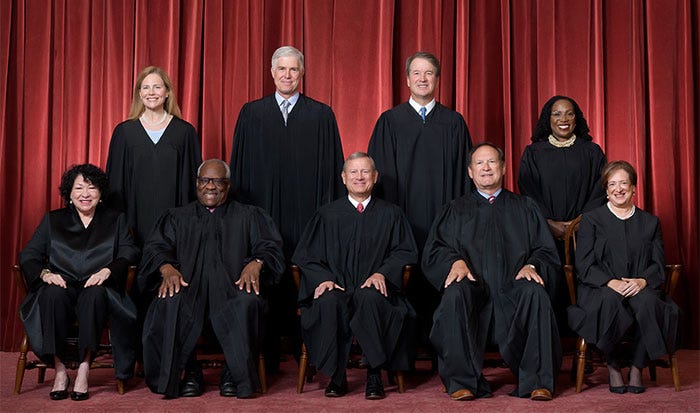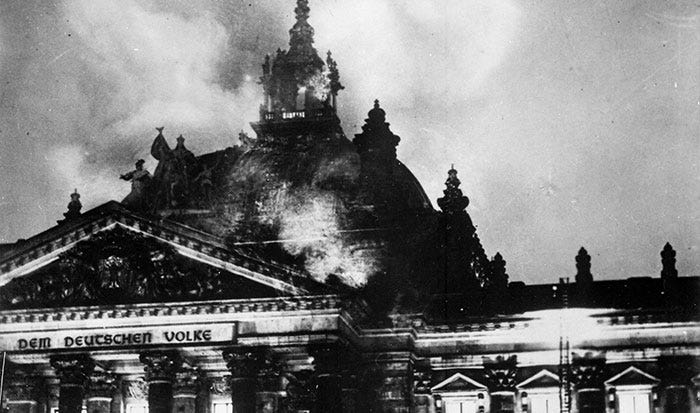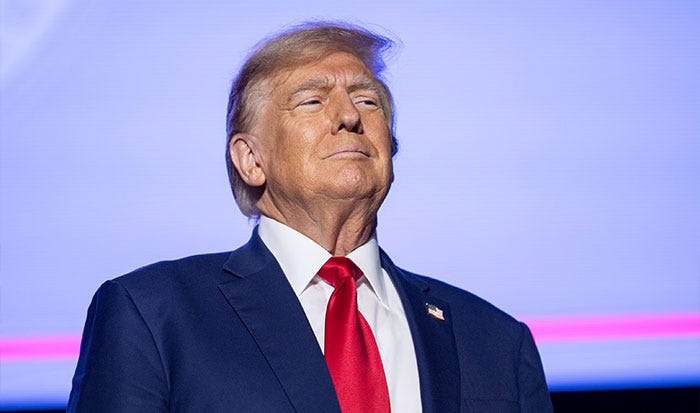On Monday, July 1, six Supreme Court justices—all appointed by Republican presidents—of nine agreed that if the president takes any action within the powers granted to him through the U.S. Constitution, he cannot be prosecuted.
The verdict also grants presidents immunity “from criminal prosecution for a President’s acts within the outer perimeter of his official responsibility,” meaning a president is immune from prosecution if his action pertains to his official status in any way.
The opinion issued by the three dissenting justices lists scenarios in which presidents could abuse immunity, like organizing a military coup to hold on to power or ordering the assassination of a political rival.
“The relationship between the President and the people he serves has shifted irrevocably. In every use of official power, the President is now a king above the law.” — Justice Sotomayor
If Donald Trump is re-elected and Project 2025 is set in motion, he will not be America’s 47th President of the United States. He will be its first dictator. This isn’t hyperbole or fearmongering. This is simply looking at the past and attempting to learn from it for fear of repeating it…
The Enabling Act of 1933: The Catalyst for Hitler’s Totalitarian Regime
The rise of Adolf Hitler and the Nazi Party is, of course, one of the most significant and harrowing events in modern history.
A pivotal moment in this rise was the passing of the Enabling Act of 1933, a piece of legislation that granted Hitler and his cabinet the power to enact laws without the involvement of the Reichstag (the German parliament). This effectively dismantled the democratic framework of the Weimar Republic and paved the way for establishing a totalitarian regime.
Understanding the Enabling Act's implications is crucial to comprehending how Hitler and the Nazis consolidated their power and initiated a reign of terror that led to World War II and the Holocaust.
The Weimar Republic
The Weimar Republic, established in 1919 after Germany’s defeat in World War I, was a democratic experiment fraught with challenges.
The Treaty of Versailles imposed harsh reparations on Germany, leading to economic turmoil, hyperinflation, and widespread discontent. Political instability was rampant, with numerous factions vying for control, including communists, socialists, and right-wing extremists.
The Great Depression of 1929 further exacerbated the economic woes, leading to massive unemployment and social unrest.
The Rise of the Nazi Party
Amidst this backdrop of instability, the Nazi Party, led by Adolf Hitler, gained significant traction by exploiting national grievances, promoting a message of German nationalism, and offering scapegoats for the nation’s problems, mainly targeting Jews, communists, and other minorities.
In the July 1932 elections, the Nazis became the largest party in the Reichstag, though they did not achieve an outright majority. Political maneuvering and backroom deals eventually led to Hitler being appointed Chancellor on January 30, 1933.
The Reichstag Fire and Decree
The Reichstag fire on February 27, 1933, was a pivotal event that Hitler used to his advantage. The fire, which destroyed the Reichstag building, was blamed on communists, creating a climate of fear and urgency.
The very next day, President Paul von Hindenburg, under Hitler’s urging, signed the Reichstag Fire Decree. This decree suspended civil liberties and allowed for the arrest of political opponents, particularly communists, under the pretext of protecting the state from insurrection.
The Enabling Act: March 23, 1933
With the Reichstag Fire Decree curbing civil liberties and suppressing opposition, Hitler moved to consolidate his power further.
The Enabling Act, formally known as the “Law to Remedy the Distress of the People and the Reich,” was introduced to the Reichstag on March 23, 1933. This act would grant Hitler the authority to enact laws without the Reichstag’s consent, effectively sidelining the legislative branch and nullifying the checks and balances of a democratic government.
To secure the necessary two-thirds majority for the Enabling Act’s passage, the Nazis used intimidation, threats, and strategic alliances. Communist and Social Democrat deputies were either arrested or prevented from attending the vote. Under significant pressure, the remaining delegates voted overwhelmingly in favor of the act, with only the Social Democrats opposing it. The final vote was 444 to 94.
The Impact of the Enabling Act
The passage of the Enabling Act marked the end of the Weimar Republic and the beginning of Hitler’s dictatorship. With legislative powers concentrated in his hands, Hitler moved swiftly to consolidate control:
Elimination of Political Opposition: Political parties were banned, and opposition leaders were imprisoned or executed. The Nazi Party became the sole political entity.
Centralization of Power: Regional governments were brought under Nazi control, ensuring that all administrative power was centralized in Berlin.
Suppression of Civil Liberties: The press, trade unions, and civil society organizations were suppressed or co-opted into the Nazi regime. Propaganda became a tool to indoctrinate the population.
The Road to Totalitarianism and War
With unchecked power, Hitler implemented policies that laid the groundwork for World War II and the Holocaust.
The Nuremberg Laws institutionalized anti-Semitism, stripping Jews of their rights and setting the stage for their eventual extermination. Militarization and aggressive foreign policies led to the annexation of neighboring territories and, ultimately, the invasion of Poland in 1939, which triggered the war.
Lessons for Today
The Enabling Act of 1933 serves as a stark reminder of how fragile democracy can be in the face of economic distress, political instability, and charismatic authoritarian leaders. For those of us with a conscience, it underscores the importance of vigilance, civic engagement, and the protection of democratic institutions.
In a world where authoritarianism is again on the rise, understanding the history of the Enabling Act and its consequences is crucial. It teaches us the value of safeguarding civil liberties, ensuring checks and balances, and fostering a political culture that resists the allure of simple solutions offered by demagogues in times of crisis.
Donald Trump will not be contained by the courts or the rule of law—the Supreme Court, corrupted by the three federal judges he appointed (Neil Gorsuch, Brett Kavanaugh, and Amy Coney Barrett), has ensured that.
If he wins, Trump will become the most powerful person ever to hold the office of President of the United States. He will be able to consolidate and centralize power, eliminate political opposition, and suppress the freedoms of anyone who gets in his way. We cannot let that happen.
“Be careful, when a democracy is sick, fascism comes to its bedside, but it is not to inquire about its health.” — Albert Camus







